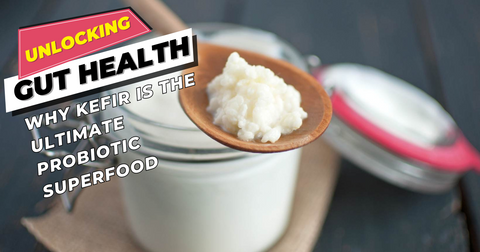In recent years, kefir has taken the health and wellness world by storm. Known for its probiotic properties, kefir is now recognized as a leading contender in the realm of gut health. While there are various types of kefir, including milk kefir and water kefir, it’s essential to understand their differences and how they contribute to your overall health.
Understanding Kefir: A Probiotic Superstar
What is Kefir?
Kefir is a fermented drink made using grains containing a mixture of bacteria and yeasts. When these grains are added to milk or sugar water, they ferment the liquid, creating a tangy, effervescent beverage rich in probiotics. The most popular form, milk kefir, contains over 50 different strains of beneficial bacteria and yeasts, while water kefir generally has between 8 to 15 strains. This diversity of microorganisms is one reason why kefir has gained popularity as a top probiotic food.
Why Probiotics Matter
Probiotics are live microorganisms that can confer health benefits when consumed in adequate amounts. They help maintain the balance of good bacteria in the gut, which is crucial for digestive health, immune function, and even mental well-being. Kefir stands out because it’s one of the most studied fermented foods, with extensive research highlighting its effects on gut health.
The Benefits of Kefir for Gut Health
1. Enhances Gut Microbiome Diversity
One of the primary benefits of kefir is its ability to improve gut microbiome diversity. A diverse microbiome is associated with better health outcomes, including reduced inflammation and improved digestion. According to a paper published in the Frontiers of Nutrition, kefir not only introduces beneficial bacteria but also contains bioactive compounds that directly affect gut cells, modulating the gut environment for the better.
2. Reduces Inflammation
Inflammation is often at the root of many gut issues. A study published in Inflammopharmacology demonstrated that kefir could significantly reduce inflammation in a rodent model. Mice that received kefir showed a 45% reduction in inflammation, compared to those who received a placebo. This finding suggests that kefir could be an effective natural remedy for individuals dealing with inflammatory gut conditions.
3. Supports Digestive Health
Kefir can be especially beneficial for those suffering from gastrointestinal diseases. Research published in PLOS ONE found that common strains of bacteria found in kefir improved symptoms in patients with various GI disorders. Incorporating kefir into your diet may alleviate symptoms and promote better digestion, making it a valuable addition to your daily routine.
4. Boosts Immune Function
Kefir is rich in bioactive compounds that support immune function. These compounds help strengthen the gut barrier, reducing gut permeability, and preventing toxins from leaking into the bloodstream. A robust gut barrier is crucial for maintaining overall health and preventing systemic inflammation.
How to Incorporate Kefir into Your Diet
5. Best Times to Consume Kefir
To maximize the probiotic benefits, it’s recommended to consume kefir on an empty stomach, approximately 30 minutes before a meal. This approach allows the beneficial bacteria to thrive without interference from other foods. When you eat afterward, it provides a nutrient-rich environment that can help the probiotics flourish.
6. Daily Intake Recommendations
Incorporating kefir into your daily routine doesn’t require drastic changes. A serving size of about 1/2 to 1 cup per day is often sufficient to reap the benefits. You can enjoy it plain, mix it with smoothies, or use it as a base for salad dressings.
Kefir vs. Other Probiotic Sources
7. Whole Food vs. Supplement Form
While probiotic supplements can be effective, they often lack the diversity of strains and the bioactive compounds present in whole foods like kefir. Supplements tend to contain specific strains, while kefir offers a more holistic approach by providing a variety of beneficial bacteria and nutrients.
8. Nutritional Profile of Kefir
Kefir is not only a source of probiotics but also contains essential nutrients. It's rich in calcium, protein, and vitamins like B12 and K2. These nutrients contribute to bone health and help maintain overall vitality, making kefir a nutritious choice beyond its probiotic benefits.
The Connection Between Kefir and Mental Health
9. The Gut-Brain Axis
Recent research has highlighted the connection between gut health and mental well-being, known as the gut-brain axis. Studies suggest that the consumption of kefir may have positive effects on mood and anxiety levels. For instance, a study published in the Journal of Microbiome showed that certain strains of kefir reduced stress responses in mice, indicating potential mental health benefits for humans as well.
10. Long-Term Benefits for Mood
Regular consumption of kefir may help enhance your overall mood and reduce anxiety. As your gut microbiome becomes more diverse, it can positively influence your mental state, leading to a more balanced and resilient emotional well-being.
Conclusion
In summary, kefir is not just a trendy probiotic food; it is a powerhouse for gut health and overall well-being. With its rich diversity of beneficial bacteria, ability to reduce inflammation, and support for immune function, incorporating kefir into your diet is a simple yet effective way to enhance your gut microbiome. Remember to consume it on an empty stomach for maximum benefits and enjoy the nutritional perks it offers. As the research continues to unfold, kefir is proving to be a vital player in the quest for optimal health, making it a worthy addition to your daily routine. So, whether you prefer it in smoothies, as a drink, or in recipes, make kefir your go-to probiotic food for a healthier gut!




